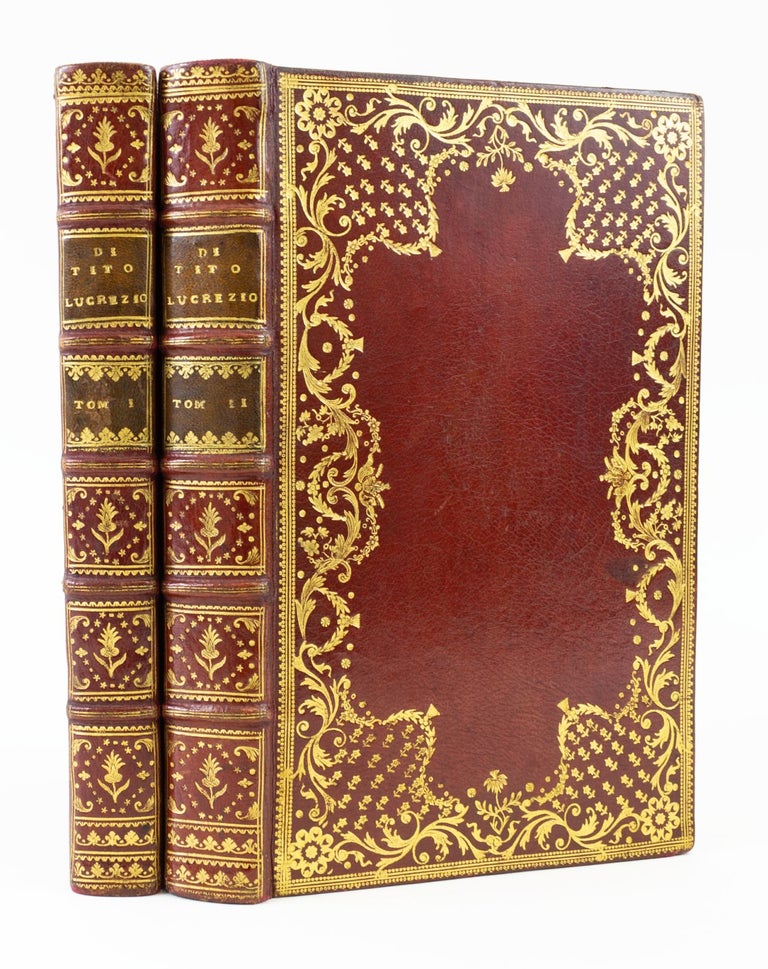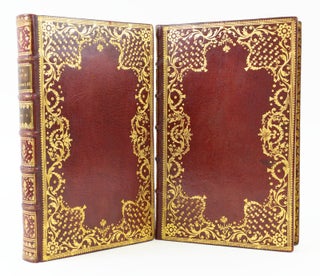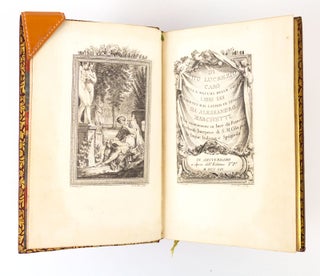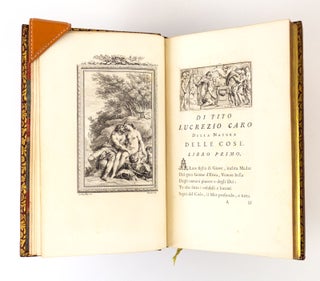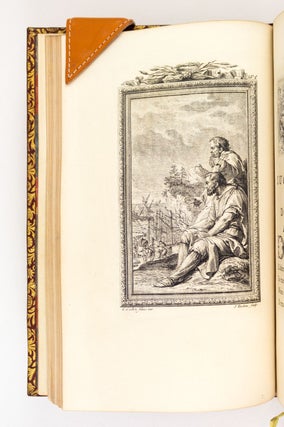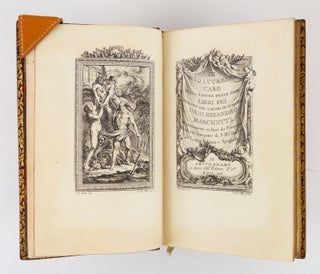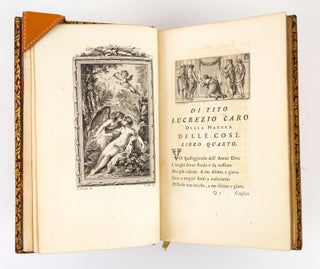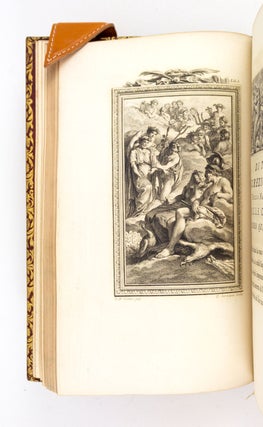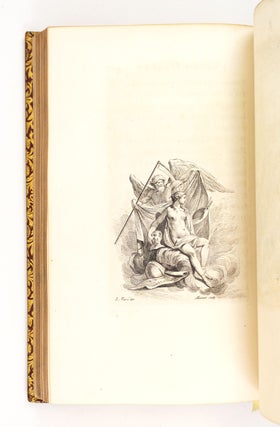DI TITO LUCREZIO CARO DELLA NATURA DELLE COSE.
(Amsterdam [i.e., Paris]: A spese dell'editore To. Po. 1754). 230 x 144 mm. (9 1/8 x 5 3/4"). Two volumes. Translated from Latin into Italian by Alessandro Marchetti.
SPLENDID CRIMSON MOROCCO, GILT, BY DEROME LE JEUNE (his ticket with address of Rue St. Jacques on front pastedown of volume I), covers with border of multiple gilt rules and dotted rolls enclosing an ornate Rococo frame of flowers, acanthus leaves, garlands, catkins, and grape clusters, the cornerpieces semé with floral sprigs, raised bands, spines gilt in compartments with pineapple centerpiece within a lozenge of small tools, volute cornerpieces, two brown morocco labels, gilt-rolled turn-ins, marbled endpapers, all edges gilt. Copper-engraved frontispiece and title page after Eisen in each volume, six engraved plates by Lemire, Aliamet and others after Cochin, Eisen, and Le Lorrain, and seven vignette headpieces and five vignette tailpieces, most after Cochin. Gordon 505; Brunet III, 1222. For the illustrations: Cohen-de Ricci 665-6; Fürstenberg, p. 86; Ray 9. ◆Slight wear to corners, somewhat broad (but faint) offsetting to flyleaves from turn-in glue, just a hint of offsetting from engravings, but A LOVELY SET IN VERY FINE CONDITION, clean and fresh internally with comfortable margins and excellent impressions of the engravings, and the nearly unworn bindings bright with gilt.
This attractively printed Italian translation of "De Rerum Natura" boasts "very beautiful" engravings, in the opinion of Cohen-de Ricci, and opulent bindings by one of the greatest names in the history of French bookbinding. Written in the first century B.C., the text here is considered one of the best expositions on the philosophy of Epicurus. Popular in the Roman Empire, it fell into obscurity before being rediscovered by Italian humanist Poggio Bracciolini in the 15th century. It became one of the most influential humanist texts of the Renaissance and the Enlightenment, inspiring writers and thinkers from Montaigne to Thomas Jefferson, a self-professed Epicurean who owned multiple editions. Translator Alessandro Marchetti (1633-1714) completed the first Italian vernacular version of Lucretius in 1669 but was denied permission to publish; it finally appeared in print in 1717. The present edition was revised by Francisco Gerbault, Italian and Spanish interpreter to Louis XV.
The beautiful vignettes, tailpieces, and plates are mostly the work of Charles-Nicolas Cochin (1715-90) and Charles-Dominique-Joseph Eisen (1720-78), and so impressed Gordon Ray that he declared this edition "the model for the sumptuous Rococo volumes of the ensuing twenty-five years." Ray considers this some of Cochin's finest work, noting that the artist was "more at home with Lucretius' philosophical poem than with the amorous classical scenes of Ovid's 'Metamorphoses,'" and that his engravings here "are marked not only by the mastery of outline and firmness of composition which never deserted him, but also by acute observation and unpretentious humor."
There were no fewer than 18 members of the Derome family who made their livings as binders in Paris from the middle of the 17th century until the first quarter of the 19th, but by far the most distinguished family member was Nicolas-Denis, called "le jeune" (1731-88). Known for the gracefulness of his bindings, and for being capable of "amazing delicacy" (in Hobson's words), Derome le jeune was, simply, the leading binder of the day, and his work was much in demand. Because he refused to turn away customers, Derome was forced to hire a number of assistants, whose work he could not always supervise closely. However, Thoinan says that the binder's best work is indicated by the presence of his ticket, as here. The excellent condition of our volumes allows the reader to appreciate "ancien régime" French book arts at their zenith, with smooth, well-margined pages, seductive illustrations, and bindings exuberant with gilt. (ST17070)
Price: $8,500.00

